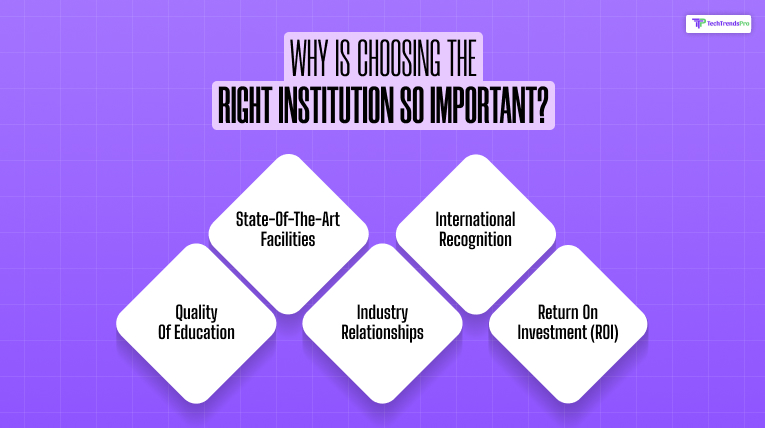
Deciding where to get a professional degree is likely the most significant choice one will ever make in their professional degree and educational life.
If you aspire to pursue a career in law, medicine, engineering, business, design, or teaching, your chosen institution can make or break your future success, salary, and well-being.
And with tens of thousands of institutions globally and aggressive college marketing, how do you really choose the best one?
This article provides key answers parents and students have been seeking when making this important decision. From reputation analysis to internship screening, we will break it down for you.
What Is A Professional Degree?

A professional degree is a type of qualification that aims to prepare students for professional careers in particular areas of:
- Medicine (MBBS, MD)
- Law (LLB, JD)
- Engineering (B.E., B.Tech)
- Architecture (B.Arch)
- Business (BBA, MBA)
- Bachelor of Education (B.Ed., M.Ed)
- Social Work (MSW)
- Dentistry, Pharmacy, Veterinary Sciences, etc.
These degrees tend to involve practical ability, practical application, and licensing or certification after completion.
Why Is Choosing The Right Institution So Important?

Your institution choice will have an impact on:
- The quality of education
- Availability of state-of-the-art facilities
- Industry relationships and job placement
- International recognition of your degree
- The return on investment (ROI)
The high-visibility institution will open more doors, while a lower-visibility institution could quite possibly restrict your future options.
How Do You Identify The Best Institution?

The following is a step-by-step question-by-question guide to assist in making your choice:
1. What Is The Reputation And Ranking Of The Institution?
Reputation is not everything, yet it counts. Take note of:
- National and international rankings (e.g., QS, Times Higher Education)
- Alumni success
- Accreditation (NAAC, AACSB, ABET, etc.)
Tip: Google the “[institution name] + reputation” and read student forums or Reddit for raw comments.
2. Does The Program Have Strong Industry Connections?
Professional degrees require experiential learning. Ask:
- Are there tie-ups with top companies or hospitals?
- Are there internships, residencies, or co-op opportunities?
- What is the placement rate after graduation?
Job readiness is greatly enhanced through hands-on training.
3. What Is The Curriculum Like?
The top universities revamp their syllabus periodically in accordance with industry demands.
- Are the courses practice-based or theory-bound, and old?
- Are there simulations, labs, or studios?
- Is the course curriculum inclusive of innovativeness and critical thinking?
Shortlist a few universities and compare their curricula before making a decision.
4. What Are The Faculty Credentials?
Great teachers make a huge difference in education.
- Are instructors industry professionals or strictly academic?
- Do they have advanced degrees, publications, or patents?
- Are they taught by senior professors or junior faculty?
Many colleges in Dubai post faculty profiles on the web—read them!
5. What Is The Cost And Return On Investment (ROI)?
More does not necessarily equal better.
- Think total cost: tuition, room, books, and living expenses.
- How does the average starting salary after graduation compare?
- Are there scholarships, grants, or financial aid?
Compute ROI = (Average Starting Salary ÷ Total Program Cost). The larger, the better.
6. Is There International Recognition Or Mobility?
Certain professional degrees have utility only within a country.
- Is the degree widely recognized abroad or confined to a region?
- Is provision for credit transfer, foreign study, or student exchange programs available?
If you will be employed abroad, ensure that your degree will be accepted there.
7. What’s The Student Support System Like?
The standard of a student services organization can make a significant difference to your success.
- Are there career counselors, study guides, or mental health services?
- Is on-campus accommodation like student housing in Los Angeles secure and available?
- How lively are societies, sports, or clubs?
Well-being support is just as important to learning quality.
8. How Good Are The Facilities And Infrastructure?
Good infrastructure enables good learning:
- Laboratories, libraries, studios, and software access
- Wi-Fi campus and smart classrooms
- Simulation medicine, engineering, etc., centers
Browse photo galleries or visit in person if possible.
9. Are There Research Or Innovation Opportunities?
If you’re researching:
- Does the university have funded projects or research labs”?
- May students publish papers or work on research projects?
- Can undergraduates participate, or is it postgraduates only?
Research experience sharpens analytical and technical skills.
10. What Alumni Have To Say
Get in touch with alumni students on LinkedIn or alumni forums:
- Were they satisfied with the experience?
- Did the degree pay off professionally?
- Would they recommend it?
Honest feedback might reveal what slick brochures do not.
Special Considerations For Different Fields
Medical Students
- Confirm hospital collaborations, clinical exposure, and NMC/MCI accreditation.
Law Students
- Search for court internships, moot courts, and bar exam prep.
Engineering Students
- Lab sessions, campus placements, innovation centers, and industry projects.
Design Students
- Studio hours, mentorship, and portfolios are worth more than theory.
Business Students
- Internships, case competitions, networking, and MBA track records are prioritized.
When Should You Begin Researching Institutions?

At least 1 year before you begin:
- Shortlist 8–10 institutions
- Check entry and eligibility tests
- Visit open days or attend webinars
- Prepare an interview or portfolios if required
Research early = more options, better choices.
Common Errors To Avoid
- Failure to check accreditations
- Selecting by peer pressure or brand names only
- Failure to consider your learning style or career aspirations
- Failure to visit the campus or conduct a virtual tour
- Getting influenced by glitzy marketing and no depth
Bonus Tips For Choosing The Best Institution
- Create a comparison table of the advantages and disadvantages of each college
- Utilize tools like NIRF, QS Rankings, or College Board
- Employ career counselors
- Watch student YouTube reviews and day-in-the-life vlogs
Trust Research, Not Hype
Selecting the right school for your career degree is a mixture of personal aspirations, quality of study, and planning ahead. Take your time. Research widely, talk to alumni, talk to professionals, and utilize your critical thinking.
Your degree will get you in the room—but only if you pick the school that serves your agenda.
Read Also:






